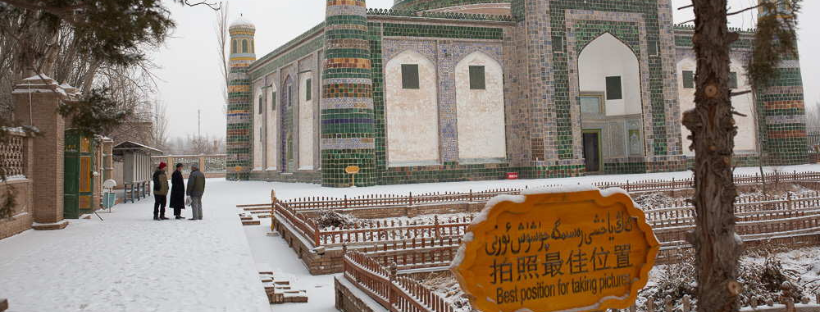
I. Key Takeaways
- Prominent international travel companies are currently offering guided tours to East Turkistan amidst genocide and crimes against humanity;
- Sites in Kashgar, Turpan, Ürümchi, and other destinations on tour itineraries are connected to genocide and crimes against humanity through repression of religious belief and expression, destruction of tangible and intangible cultural heritage, as well as large-scale racial profiling, surveillance, internment and imprisonment of Uyghurs and other Turkic peoples;
- Travel companies repeat and reinforce Chinese government narratives of an “exotic” people for the purpose of tourist consumption;
- Many of these tours provide perverse and problematic “experiences” for visitors, like visits to Uyghur homes, which families are not in a position to refuse, given an environment of securitization and state control. This constitutes a gross violation of privacy and perpetuates the surveillance programs that have been carried out in Uyghur homes;
- By bringing tourists to East Turkistan, these travel companies are implicitly supporting the normalization of genocidal Chinese government policies intended to destroy the Uyghur identity, and reinforce the complete denial of the Uyghur people to define “Uyghurness”;
- Seven recommendations to travel companies and trade associations call for ending tours to East Turkistan and for companies to meet internal, industry, and international environmental, social, and governance standards.

II. Introduction
This briefing calls on international travel companies to end tours to East Turkistan. It also calls on tourists not to take organized tours to a region during an ongoing genocide. As much as it would test ethical limits to take a tour to Rwanda, Cambodia, Rakhine State, and Darfur in the midst of the atrocities in these places, the same applies to East Turkistan.
Uyghur families have been torn apart by internment, imprisonment, forced labor programs, and enforced disappearances. Uyghur communities have been decimated by the destruction of their religion, language, and cultural heritage. Due to birth prevention policies targeting Uyghur women, the Uyghur Tribunal found that the Chinese government is committing torture, crimes against humanity, and genocide.1
Travel to places of human tragedy is known as “dark” or “disaster” tourism. Visiting sites of ethnic cleansing, natural disasters, or war as a tourist is antithetical to the common idea of travel for leisure. Individuals who visit Auschwitz-Birkenau in Poland and the Choeung Ek Genocidal Centre in Cambodia may go with the intention of internalizing the lesson of “never again.” However, the travel experience to East Turkistan, as presented in the literature of international travel companies, is not about learning such lessons.
As much as it would test ethical limits to take a tour to Rwanda, Cambodia, Rakhine State, and Darfur in the midst of the atrocities in these places, the same applies to East Turkistan.
The tours amplify Chinese state narratives of Uyghurs as folkloric and lacking modernity. These narratives form part of the government developmentalist premise to “re-educate” Uyghurs out of their Uyghurness and into a compliant, economically exploitable, population. The depiction of Uyghurs in the tourist literature aims to convey a sense of authenticity. However, given the simulacra presented at tourist sites, the lack of ability to speak to Uyghurs freely, and the prevalence of Chinese government propaganda on conditions in East Turkistan, tours to the region are inauthentic.
Since the unwinding of pandemic restrictions on international travel, particularly with the ending of Beijing’s zero-Covid policy in December 2022, tourism to China has been gradually rebounding. On March 16, 2023, The Times of London published an online article titled “Best Silk Road tours: China and the Stans of Central Asia,” that recommended two tours to East Turkistan, one offered by Bamboo Travel and the other by Intrepid Travel.2 From the article, and from the evidence presented in this briefing, some international travel companies continue to offer tours despite evidence of atrocities. However, it is not too late to reverse this decision.
This briefing highlights tours to East Turkistan available through international travel companies for 2023–24. UHRP focuses on seven companies, detailing the destinations and sites included on travel itineraries. The briefing then explains how these destinations and sites are linked to aspects of the Uyghur genocide, particularly through internment, religious repression, as well as destruction of tangible and intangible heritage. We also scrutinize the extremely problematic activity of tourists visiting Uyghur homes as part of their travel.
The travel industry is eager to demonstrate a commitment to ethical standards of business practice. These are either internal, industry, or international standards, to which the travel companies presented in this briefing have agreed and supported. The gap between the values presented to the public and the ethics of traveling to East Turkistan on an organized tour are significant.
We argue that travel to East Turkistan through an organized tour enables the genocide in a number of ways. Whether it is through repetition of Chinese state narratives or participating in a commodified version of Uyghur identity and heritage permitted by the Chinese government, to working with local partners linked to the Chinese state, there is little to suggest that a process of Uyghur empowerment is taking place.
We believe that in order to meet the standards on local empowerment expressed in their corporate and industry statements, travel companies should offer support to the Uyghur diaspora community. Uyghurs overseas do not have the privilege of traveling to East Turkistan without risk of disappearance or imprisonment. They have also become disconnected from their loved ones in the region. Beyond the purview of the Chinese state, this is a community with whom allyship is ethical.
We recommend travel companies and trade associations call for an end to tours to East Turkistan and to increase due diligence processes and human rights compliance in line with international standards. Travel companies have the opportunity to turn from selling “Genocide Tours” to becoming Uyghur allies through publicly canceling tours and condemning China’s crimes against humanity.

